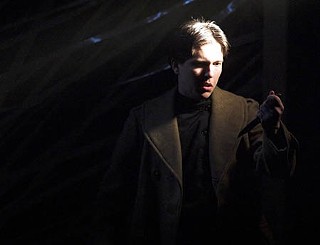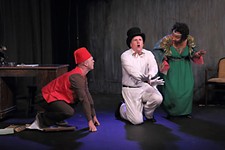Hamlet
Vortex Repertory Company's new production of Shakespeare's Hamlet has a strong contemporary feel, but ultimately it diminishes some of the power of the tragedy
Reviewed by Robert Faires, Fri., March 23, 2007
Hamlet
The Vortex, through March 31
Running time: 2 hr, 10 min
Something is effed-up in the state of Denmark.
Not just that business you may already know about the queen shedding her widow's weeds for a wedding gown just two months after her husband died and strolling down the aisle with his brother. Or that brother having murdered his brother to win both crown and queen, even. Her majesty is also popping prescription pills right and left. Her son, Hamlet, who's none too happy about his mom's rebound, is hitting the sauce pretty hard, sucking whiskey straight from the bottle. His pal Rosencrantz looks perpetually lost in a cannabis fog, and his girlfriend, Ophelia, is a cutter, regularly sneaking off by herself to slice the insides of her thighs with a razor blade. This isn't some place sliding into disorder following one man's unconscionable acts; it's a place that's been unsettled for some time, where the folks who have it all – the wealth, the position, the power – are nonetheless deeply troubled by dark desires and emotional pain that they numb any way they can; it's the Danish court by way of American Beauty.
It's no stretch to imagine yourself lost in suburbia as you watch this Vortex Repertory Company production. Guest director Jennifer Ross Nostrala has crafted a very contemporary setting, with the clothes, the music, the behavior, even the speech, to an extent, reflecting what can be seen in the lives of the privileged in Anytown, USA. This last she's accomplished by shearing away great swaths of Shakespeare's verse, particularly where the Bard is at his most archaic or flowery or ruminative, leaving prose and poetry that's frequently delivered in a proselike manner – in other words, language that sounds more like the kind people use today. It's like she wanted to keep the show from looking or sounding like traditional Shakespeare, i.e., the boring kind.
That seems to extend to the most recognized lines and speeches in the play, several of which have been eliminated. You'll hear almost no parting words of wisdom to Laertes from Polonius and no words at all about poor Yorick from Hamlet. He doesn't tell us what a rogue and peasant slave he is and gives no advice to the players. (There are, in fact, no players to give advice to, just Polonius, Rosencrantz, and Guildenstern, whom Hamlet enlists to perform the play wherein he'll catch "the conscience of the king.") Nostrala appears to be trying to strip away parts of Hamlet that have become too familiar, those "greatest hits" that audiences anticipate in a way that kills the momentum and immediacy of the story being told. Her streamlined version – which also excises the grave diggers, Fortinbras, and all that business about Norway, among other things – seems designed to inject some urgency back into a play burdened by its monumental reputation. And to an extent, it does, sustaining a tight focus on the families involved and the swift, tragic unraveling of their lives. But it comes at a steep price: the loss of the play's scope, in terms of both the larger world and human emotions and experience, particularly as expressed through the title character. Hamlet's reflections on his past, his humor, his sentimentality, his wonder at life, are all diminished here, and as a consequence, the character shrinks in our eyes. This complex creature, with a richly textured history and contradicting impulses and ceaselessly probing mind, becomes just another young man with a chip on his shoulder, disgusted with his mother, disgusted with himself, disgusted with humankind.
In that, this Hamlet isn't alone, at least. With all the substance abuse among the characters here and a bitter tone that keeps surfacing in the voices of the actors as they deliver their lines, disgust and self-loathing are widespread in this Denmark. That may be part of Nostrala's strategy for making the play feel more contemporary and relevant, and it does succeed at times in adding some fresh punch to this familiar play. It's a bit of a shock to see Ophelia engaging in self-mutilation, and Michelle Flanagan uses the character's revulsion to give her madness a forceful, accusatory edge in the scene before Ophelia drowns herself (a moment staged here, and quite effectively, in an evocative dance choreographed to Tracy Bonham's "Wilting Flower"). But overall, it makes for a rather airless environment, in which tragedy hasn't enough oxygen to blaze. Here, it isn't that something is rotten in the state of Denmark. Everything is rotten, and there can't be a fall from a great height when the characters are on the bottom already.
In a sense, Nostrala may have done her job too well. With her designers and a cast that delivers Shakespeare's text clearly and directly, she's fashioned a version of the play that looks like now and feels like now, but so much so that it comes off less a tragedy than a social critique of modern American life.











